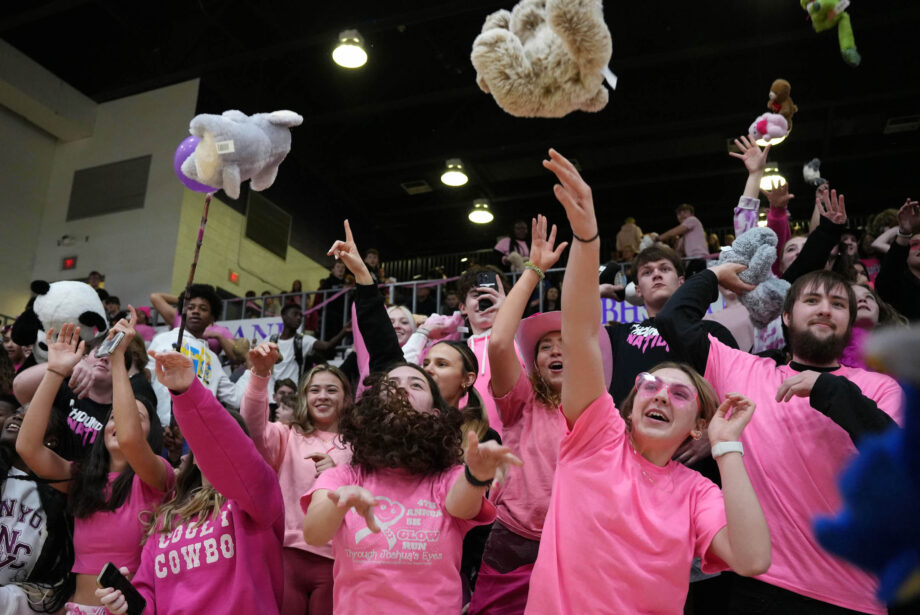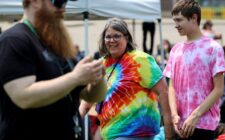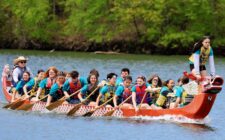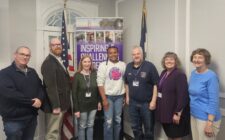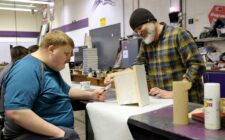On Feb. 7, 2023, dozens of teddy bears rained down from the bleachers of Carl Johanssen Gymnasium and onto the basketball court during halftime of the boys basketball game against West Burlington.
The 209 stuffed animals donated during the Teddy Bear Toss were bagged up and taken to Christina Hess-Haughey’s classroom, which serves as both a Spanish classroom and the base of operations for the Burlington High School chapter of National Honor Society.
Having gotten such a large haul, NHS members arranged for the stuffed animals to be donated to both the University of Iowa Stead Children’s Hospital and the Ronald McDonald House.
It was but one of nearly 1,000 student-led service projects completed by the BHS NHS chapter since its inception 100 years ago.
“The interesting thing is that National Honor Society as an organization is only one year older than we are as a chapter, so Burlington got on that train very quickly after they established a National Honor Society,” NHS advisor Hess-Haughey said.
The National Honor Society was established in 1921 by the National Association of Secondary Principals to promote both high-level academics, leadership, and service to community.
Becoming a member
Membership eligibility for NHS is contingent upon three factors: academics, character, and leadership.
Each year after the second trimester, students in 10th grade or above with a grade point average of 3.6 or above are invited to become NHS candidates. Those who accept the invitation then must provide evidence of their leadership capabilities in an application.
“The way they show leadership is in their application,” Hess-Haughey said. “They talk about things they’ve been involved in, not only in school, but outside of school, like maybe in their youth group or Safety Town or those types of things.”
Character of the candidates is determined by feedback from school staff gathered by a faculty council, whose members remain anonymous due to the nature of the decisions they must make.
Those who meet all the criteria are inducted each April.
To remain in NHS, students must maintain a GPA of at least 3.4, as well as participate in at least half the service projects, though Hess-Haughey said many students choose to participate in more.
Student-led service
NHS meets once a month and is governed by an executive board of students, who meet an additional time each month to plan meetings and come up with service projects, which also are conducted monthly.
NHS members oversee and coordinate each project from start to finish, and duties often include marketing and logistics management.
“It’s really exciting to see kids take on something,” Hess-Haughey said. “They decide what they want their monthly service project to be … It’s really exciting when they get it in their mind that they want to do something.”
Earlier this school year, it was a bake sale to raise money for the chapter’s 100th birthday celebration, which will be held March 9.
“We were hoping for enough money to be able to serve cookies and punch,” Hess-Haughey said. “They raised more than $500 doing a bake sale at a basketball game. They’re real go-getters.”
Among those go-getters are Sam Morehead, president of NHS, and fellow executive board members Melanie Reid, Hannah Wegmann, and Hunter Ford, who also serves as the board’s secretary.
The four joined NHS their sophomore year to further develop their leadership skills and give back to their community. NHS membership also helps with scholarships and looks good on college applications.
“I heard it was a lot of fun,” Reid said. “You do a lot of community service projects and a lot of community outreach in it. It also looks really good for college.”
Morehead said the executive board takes into account both chapter resources, such as membership size, and potential for impact when deciding on which service projects to pursue.
“We just kind of see what would help the community the most and what can NHS be involved with, because some projects we wouldn’t be able to help out with as much if we didn’t have the huge numbers, so we want to make an impact with the small amount of members we do have,” Morehead said.
Currently, that number is 26.
NHS also partners with other organizations when more manpower is needed. Ford pointed to a joint effort between NHS and Distributive Education Clubs of America, or DECA, to set up for Toys for Tots as one example.
Ford said the executive board also considers service projects completed by past members when selecting a service project. One that has been repeated for at least the past 20 years is leaf raking, wherein NHS members go to the homes of area residents who need help with their yards and rake leaves.
The project gets NHS members out and about with friends, but Reid and Weggmann said the real reward comes from knowing they’re helping someone in their community.
Reid, Wegmann, Ford, and Morehead are in their senior year at BHS, and thus have only a few more service projects ahead before they move on to the next chapter — Reid to Southeastern Community College’s three-year nursing program, Wegmann to Iowa State University to study animal sciences, Ford to the University of Iowa for pre-med and liberal arts, and Morehead to a yet-undecided university to study biomedical research.
They encourage younger students to join.
“It creates positive change in many ways,” Morehead said.
